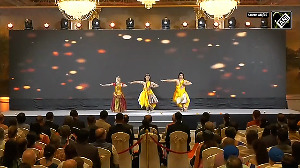Legendary musician Pandit Ravi Shankar passed away in San Diego on Wednesday. He was 92.
The musician was admitted to the Scripps Memorial Hospital in La Jolla last Thursday after he complained of breathing difficulties.
A recipient of Bharat Ratna in 1996, Shankar maintained residences in both India and the United States.
He is survived by his wife Sukanya; daughter Norah Jones; daughter Anoushka Shankar Wright and husband Joe Wright; three grandchildren, and four great-grandchildren.
"It is with heavy hearts we write to inform you that Pandit Ravi Shankar, husband, father, and musical soul, passed away today," his wife and daughter, Sukanya and Anoushka Shankar, said in a joint statement.
"As you all know, his health has been fragile for the past several years and on Thursday he underwent a surgery that could have potentially given him a new lease of life. Unfortunately, despite the best efforts of the surgeons and doctors taking care of him, his body was not able to withstand the strain of the surgery. We were at his side when he passed away," the joint statement said.
"We know that you all feel our loss with us, and we thank you for all of your prayers and good wishes through this difficult time. Although it is a time for sorrow and sadness, it is also a time for all of us to give thanks and to be grateful that we were able to have him as a part of our lives. His spirit and his legacy will live on forever in our hearts and in his music," they said in their joint statement.
The sitar exponent, perhaps could be called India's musical ambassador and was responsible for making Indian classical music popular in the West.
The sitar maestro, who brought his melodious sounds to the shores of America in the 1960s, was born April 7, 1920 in Varanasi.
Even before he broke down East-West music barriers and earned international recognition, Shankar was a prodigious talent with a lengthy resume. He studied under the legendary Allauddin Khan, worked as a music director for All India Radio and composed the highly acclaimed music of Satyajit Ray's Apu Trilogy.
In 1966, turning his sights outward, he famously tutored The Beatles guitarist George Harrison for six weeks, an experience that led Harrison to pen two songs explicitly influenced by Indian music, "Within You Without You" and "Love You To".
To briefly touch on a career choc-full of highlights: Shankar won three Grammy Awards, performed at the famous Woodstock Festival in 1969, published a best-selling autobiography, opened educational institutes and taught Indian classical music in America, was honoured by the prestigious UNESCO International Music Council in 1975, was an honorary member of the American Academy of Arts and Letters and received the 1997 Praemium Imperiale for music from the Japan Art Association.
There's an argument for super genes at work here, too, as Shankar's two daughters -- Grammy-winning American pop artist Norah Jones and budding sitar star Anoushka Shankar -- are themselves accomplished musicians.
As evidence of his staying power, consider that Shankar received India's three highest civilian honours -- the Padma Bhushan in 1967, the Padma Vibhushan in 1981 and the Bharat Ratna in 1999 -- each in a different decade!






 © 2025
© 2025